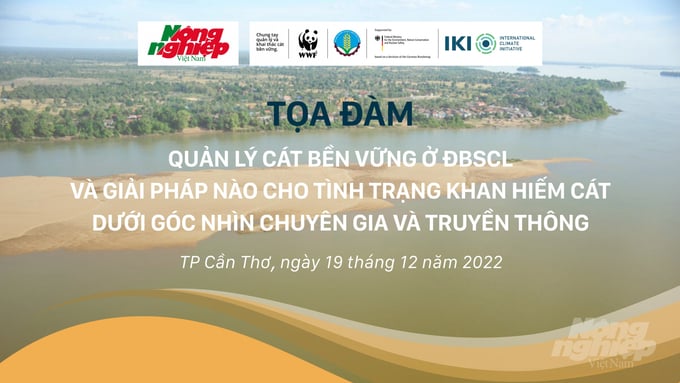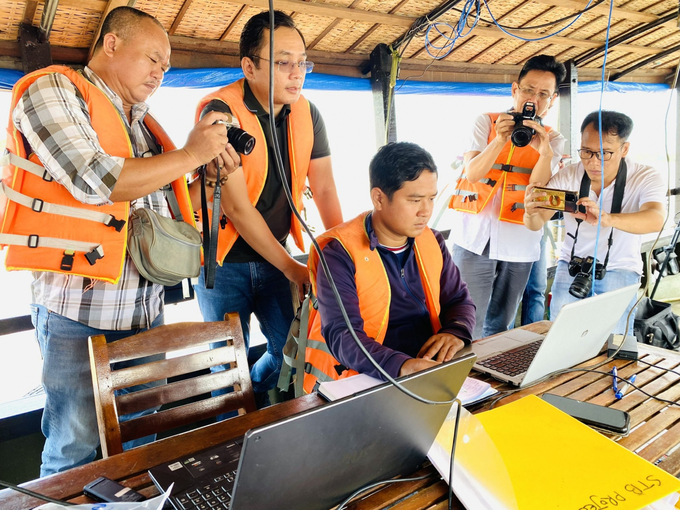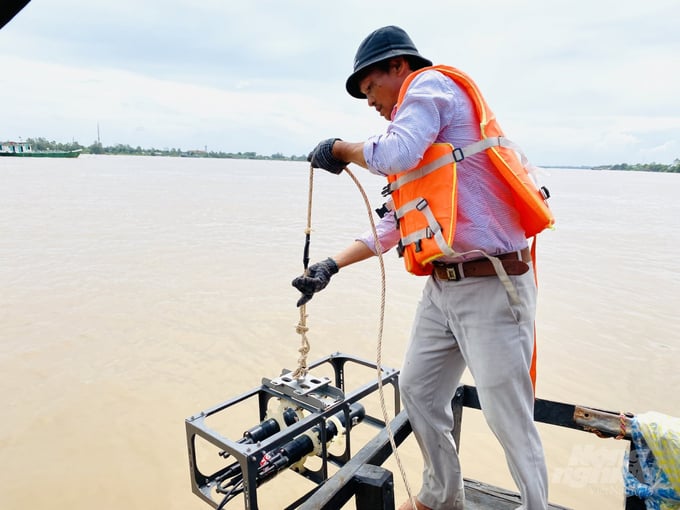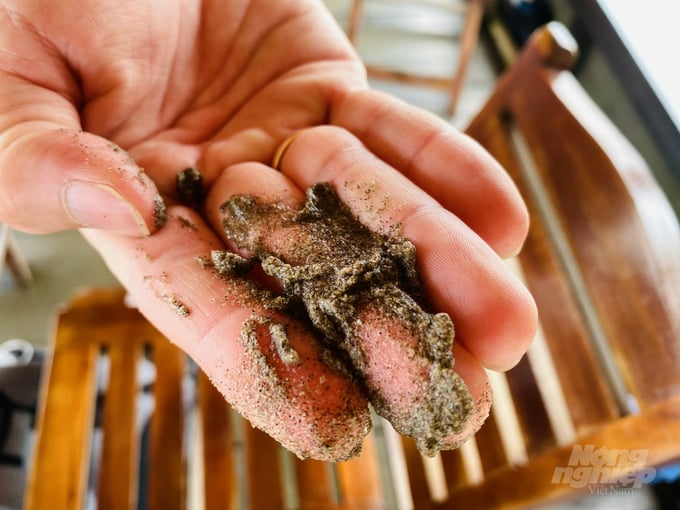June 19, 2025 | 08:46 GMT +7
June 19, 2025 | 08:46 GMT +7
Hotline: 0913.378.918
June 19, 2025 | 08:46 GMT +7
Hotline: 0913.378.918

Workshop on 'Sustainable sand management in the Mekong Delta and solutions to sand scarcity from an expert and media perspective'. Photo: Le Hoang Vu.
The World Wide Fund For Nature in Vietnam (WWF-Vietnam) collaborated with the Mekong Delta Representative Office, Vietnam Agriculture Newspaper to hold a workshop on “Sustainable Sand Management in the Mekong Delta and solutions to sand scarcity from an expert and media Perspective” in Can Tho on December 19. The workshop was attended by managers, experts, and most importantly, central and local news agencies, radio stations stationed in the Mekong Delta.
According to WWF-Vietnam, the organization is currently working with the General Department of Disaster Prevention and Control to implement the IKI-funded Sustainable Sand Management Project (IKI SMP) with the goal of mitigating impacts from climate change by supporting sustainable sand mining and management in the Mekong Delta.
To this end, journalists play a very important role in raising awareness regarding the importance of sand in the sustainable development of the region. News articles will bring attention to the value of sand, and consequently, management agencies will establish effective policies and implement urgent actions towards the strategic and sustainable use of sand.

News reporters as well as central and local radio stations organized trips to survey the sand on the Hau River in Cho Moi district, An Giang province in coordination with the World Wide Fund for Nature in Vietnam in late October and early November of 2022. Photo: Le Hoang Vu.
Mr. Nguyen Ngoc Thang, Head of the Mekong Delta Representative Office, Vietnam Agriculture Newspaper reported that the goal of the workshop is to discuss subjects of great interest to the press with regards to the management of sand resources in the Mekong Delta as well as solutions to develop sustainable sand mining in the Mekong Delta.
Managers, experts, reporters and journalists in the field of communication on climate change have made invaluable contributions in recent years. In addition, communication activities have been implemented to increase awareness of the community as well as decision-making agencies regarding how the impact of unsustainable sand mining has increased natural disasters for the Mekong Delta region. Subsequently, communications has promoted the search for alternative sources of sand and gravel in the construction industry.

Sand mining on Hau river in An Giang province. Photo: Le Hoang Vu.
“We believe that the workshop will provide experts, managers and journalists with the opportunity to gather, discuss, give opinions, share and exchange information in order to sustainably develop sand management and sand mining in Vietnam and the Mekong Delta region", Mr. Thang emphasized.
The Mekong Delta is a key economic region in Vietnam; it is also the center of agricultural production with a population of nearly 18 million people. The Mekong Delta is a major agricultural production center, accounting for 31.37% of the agricultural GDP, 50% of rice production, 65% of aquaculture production, 70% of fruit production, 95% of rice exports and 60% of fish exports.
On the other hand, the Mekong Delta region is highly susceptible to climate change; it is among the three deltas in the world that are most vulnerable to sea level rise. Extreme weather phenomena including drought, saltwater intrusion, erosion, subsidence, and landslides are increasingly common in the Mekong Delta. In addition, the overexploitation of sand has exacerbated the impacts of climate change and sea level rise. The erosion of river banks has had a significant impact on the life and production of the people in the delta. As a result, the effective, sustainable management and exploitation of riverbed sand require fundamental and long-term solutions.

River sand probing. Photo: Le Hoang Vu.
Namely, the communication as well as the timely and insightful reflections on the unsustainable sand mining in the Mekong Delta by the press play an indispensable role. Aware of the importance of the press in promoting sustainable sand use and management practices in the Mekong Delta, WWF-Vietnam in collaboration with the Mekong Delta Representative Office, Vietnam Agriculture Newspaper organized a Workshop on 'Sustainable sand management in the Mekong Delta and solutions to sand scarcity from an expert and media perspective' with the aim of discussing important issues regarding the management of sand resources in the Mekong Delta as well as the solutions to sand mining in the area.
WWF-Vietnam has recently implemented the project "Reducing climate change impacts and preventing natural disasters through the participation of the public - private sector in sustainable sand mining in the Mekong Delta" (the Sustainable Sand Management Project). The project will be implemented from July 2019 to May 2024 in order to contribute to maintaining important ecological functions and reducing socio-economic risks posed by climate change in the Mekong Delta. One of the project's goals is to increase awareness among communities and decision-making agencies regarding the impact of unsustainable sand mining, which is increasing the risk of natural disasters in the region. Thereby, the project will promote the search for alternative sources of sand and gravel in the construction industry.
So far, the project has completed survey and measurement activities under the two main work packages: the Sand Bank package and the River Morphology Maintenance Plan package. The official results is expected to be announced in March 2023.
Scientific documents show that the Mekong River Basin provides sediment to the Mekong Delta with an average annual accretion rate between 0.3 and 1.8 millimeters. This amount of sediment plays an important role in combating subsidence, landslides, saltwater intrusion in the region. It is also a source of maintaining and nurturing the delta.
However, research conducted by experts over the years have shown that the amount of alluvium and sediment in the Mekong River has decreased by approximately 50%, from 160 million tons in 1992 to 75 million tons in 2014. According to a report made by The Mekong River Commission announced in 2018, the total amount of alluvium and sediment (including sand) pouring into the Tien and Hau rivers were on a steady decline, and it is expected to reach only 4.5 million tons by 2040. This drastic fall is caused by a series of hydropower plants constructed upstream.
Moreover, the depth of Tien and Hau rivers in 2008 has been recorded to increase by 1.3 meters compared to 1998, which is equivalent to a reduction of between 90 and 110 million cubic meters of sediment in the river bed. The increase in the depth of Tien and Hau rivers accelerated from 2008 to 2016, at an average of 3-7 meters. This figure shows that more sediment is being removed from the riverbed compared to the period of 1998-2008.

Research by experts has shown that the amount of alluvium and sediment in the Mekong River has decreased by nearly 50%, from 160 million tons in 1992 to 75 million tons in 2014. Photo: Le Hoang Vu.
Most notably, approximately 66% of the coastline in the entire Mekong Delta is at risk of landslides. The bank erosion of Tien and Hau rivers in the Mekong Delta is increasingly severe, escalating in terms of both frequency and scale. The impacts of landslides have been clearly identified and the disastrous landslide at Vam Nao River, located at the section passing through My Hoi Dong commune, Cho Moi district, An Giang province that occurred in April 2017 has had undeniable consequences. The event is an unforgettable memory for the people and a concern for the functional sectors, experts, scientists and journalists, who wish to find a solution to prevent similar disasters through “sustainable sand management”.
The consultation report was carried out by WWF-Vietnam and the General Department of Disaster Prevention and Control in 13 provinces and cities across the Mekong Delta in October and November 2020. Accordingly, An Giang province recorded 53 landslides in 2020; Dong Thap lost around 329 hectares of land due to landslides; Can Tho city recorded 30 landslides. The riverbank erosion in Soc Trang province has been developing aggressively since 2019. Namely, the entire province lost at leaset 2,212 meters of riverbank length. The cause for which includes unsustainable sand mining.
Translated by Nguyen Hai Long
![Turning wind and rain into action: [9] Digitizing hydrometeorological data in response to climate change](https://t.ex-cdn.com/nongnghiepmoitruong.vn/608w/files/news/2025/06/17/z6704423696987_15fd32ffc26d590d204d520c9dac6786-nongnghiep-165943.jpg)
(VAN) Farmers have begun accessing hydrometeorological applications to adjust their cropping schedules, aiming to ensure productivity and adapt to climate change.
![Turning wind and rain into action: [8] Real-time salinity detection and early warning technology](https://t.ex-cdn.com/nongnghiepmoitruong.vn/608w/files/news/2025/06/17/z6704423696987_15fd32ffc26d590d204d520c9dac6786-nongnghiep-151127.jpg)
(VAN) Thanks to the integration of modern hydrological-hydraulic models, remote sensing technologies, and artificial intelligence, the accuracy of hydrological forecasting has significantly improved.
![Turning wind and rain into action: [7] Early disaster warnings help marine farmers minimize losses](https://t.ex-cdn.com/nongnghiepmoitruong.vn/608w/files/news/2025/06/17/z6704423696987_15fd32ffc26d590d204d520c9dac6786-nongnghiep-142942.jpg)
(VAN) In recent years, thanks to early disaster warnings and forecasting, marine farmers in Khanh Hoa province have been able to reduce risks and losses, thereby improving production efficiency.
![Turning wind and rain into action: [6] ‘Four on-the-spot’ disaster management software](https://t.ex-cdn.com/nongnghiepmoitruong.vn/608w/files/news/2025/06/17/e5a48259d6a262fc3bb3-nongnghiep-183800.jpg)
(VAN) By simply activating the scenario on the disaster management software, the relevant authorities immediately know how many households need to be evacuated, where to evacuate them to, and by what means of transportation…
![Turning wind and rain into action: [5] Hue applies modern technology in disaster forecasting](https://t.ex-cdn.com/nongnghiepmoitruong.vn/608w/files/news/2025/06/17/z6704423696987_15fd32ffc26d590d204d520c9dac6786-nongnghiep-093938.jpg)
(VAN) In Hue city, modern technology has recently been applied in meteorological and hydrological forecasting and warning, helping to reduce the damage caused by natural disasters.

(VAN) A cutting-edge farming technique being implemented on an experimental ranch in Arizona's Sonoran Desert has already saved a billion gallons of water over five years, according to Civil Eats.

(VAN) Poultry and pig production and the environment can be boosted through enhanced water technology, according to new research.